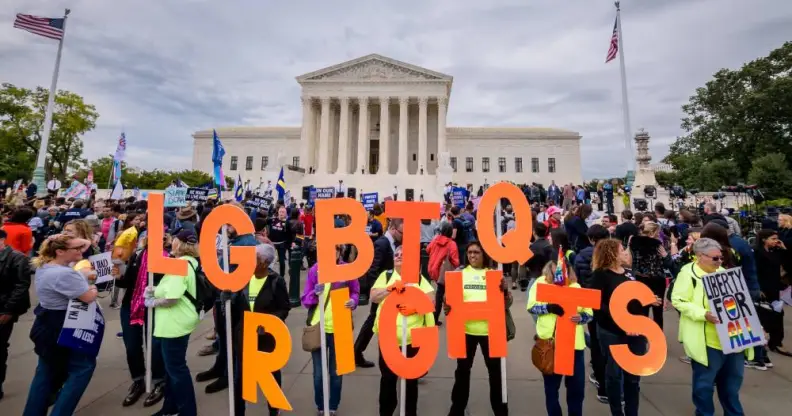Conservative Supreme Court justices fire warning shot on religious freedom and LGBT+ rights

Protesters holding a banner reading “LGBTQ Rights” outside the Supreme Court in Washington DC. (Erik McGregor/LightRocket via Getty)
Supreme Court judges Samuel Alito and Clarence Thomas have indicated that “the day will soon come” when the court rules on religious freedom and LGBT+ rights.
On Monday (21 March), the court declined to review a lower court’s decision to allow case involving a Seattle-based Christian organisation that was sued over its anti-LGBT+ hiring policy.
The long-running case concerns a bisexual lawyer who was refused a job at the Union Gospel Mission because of his sexuality. Matthew Woods, who is bisexual and in a same-sex relationship, brought a case against the Union Gospel Mission, a non-profit which offers services to help people without housing in the Seattle area, in 2017.
He had volunteered with the non-profit for more than three years before he applied for a role in 2016 within its free legal aid clinic.
However, Woods was told that his application would be rejected because the Union Gospel Mission’s “code of conduct excludes homosexual activity”, the Associated Press reported.
The Mission, one of the largest service providers in the Seattle area, argued the state’s anti-discrimination legislation doesn’t apply because it’s a religious employer.
Woods’ suit argued that the position he applied for was protected by anti-discrimination law as it was a frontline social services role, according to the Seattle Times. But the Union Gospel Mission said its legal aid work couldn’t be separated from its Christian work.
A state court originally dismissed Woods’ lawsuit. But in March 2020, the Washington Supreme Court overturned the first court’s ruling, allowing Woods’ lawsuit to go forward.
It was this decision that the US Supreme Court was asked to review. Though it declined, judge Alito indicated the conservative wing of the court could be interested in taking it up once the Washington courts have reached a final decision.
“We have yet to confront whether freedom for religious employers to hire their co-religionists is constitutionally required, though the courts of appeals have generally protected the autonomy of religious organisation to hire personnel who share their beliefs,” Alito wrote.
“But in this case the confrontation may be inevitable, as it involves an employment dispute between a religious employer and an applicant who was not hired because he disagreed with that employer’s religious views.
He added: “But the day may soon come when we must decide whether the autonomy guaranteed by the First Amendment protects religious organisations’ freedom to hire co-religionists without state or judicial interference.”
Alito indicated his position when it come to religious freedoms and LGBT+ rights, writing: “To force religious organisations to hire messengers and other personnel who do not share their religious views would undermine not only the autonomy of many religious organisations but also their continued viability.”
Woods’ attorney Denise Diskin said in a statement to The Hill they will continue to fight the mission’s anti-LGBT+ hiring practices in state court.
“Discrimination does not belong in social services, and we are excited to begin the process of confirming that LGBTQ+ people are just as qualified as anyone else to provide support and help to vulnerable people in their communities,” Diskin said.
John Bursch, a lawyer with conservative Alliance Defending Freedom and who is representing the Union Gospel Mission, said Alito’s opinion served as an endorsement of the group’s religious freedom arguments in court.
“Courts have consistently recognized that a religious organisation’s purpose will be undermined if the government forces it to hire those who do not share and live out the group’s beliefs,” Bursch said.
The Supreme Court will soon hear a separate, high-profile case involving a clash between religious freedoms and the rights of LGBT+ people. The case involves a Colorado web designer who argued her religious beliefs prevent her from offering services to same-sex couples.
Her case is expected to be heard in the fall.

